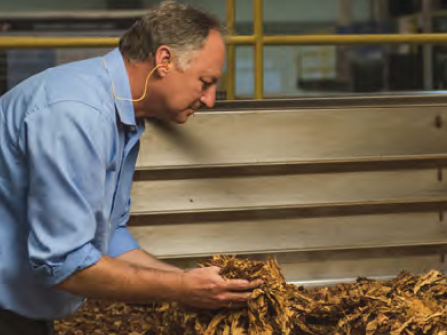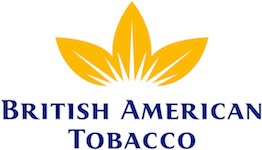British American Tobacco | A View from the Inside
BAT’s Group Operations Director Alan Davy explains why supporting sustainable agriculture remains such a priority, and how the company is responding to major issues impacting farming communities.

BAT’s Sustainable Agriculture & Farmer Livelihoods Focus Report
Why does BAT have such a strong focus on sustainable agriculture and farmer livelihoods?
Tobacco leaf remains at the core of our products, so the farmers who grow it are at the heart of our supply chain. Our sustainable agriculture objectives are fundamental to ensuring the continued success and long-term security of our business and, crucially, to fulfilling our role in wider society to support farmers and their communities, now and in the future.
I’ve been working in the tobacco industry for 30 years and during this time I’ve seen huge changes. External standards and expectations have evolved; new challenges, such as ageing farmer populations and climate change, have emerged; and innovative, more sustainable agricultural and livelihood practices have developed.
As a business, we’ve adapted and continually refined and strengthened our approach. It’s a strategic focus area that we’re committed to for the long term.
BAT does a lot of work with its 90,000+ directly contracted farmers, but what about the 260,000+ farmers who your third-party suppliers source from?
It’s an absolute must that every one of our suppliers participates in the industry’s Sustainable Tobacco Programme (STP), which includes specific requirements for conducting farmer training, and ensuring the farmers understand and meet STP’s many different farm-level criteria.
Our suppliers also have to adhere to the requirements of a number of other BAT policies and standards, covering areas such as human rights, environment, health and safety, and use of agrochemicals, which we communicate and ask them to sign up to every year.
In order for the farmers to meet these standards, they need support. So the vast majority of our suppliers have their own network of expert field technicians to provide farmers with guidance, technical assistance and capacity building, as well as supporting wider sustainability programmes and community-based projects. You can find some great examples of this in the case studies from our suppliers in Mozambique and Turkey, on pages 11 and 16.
How do you respond to claims that tobacco growing has far worse environmental impacts than other crops?
Many of the issues that are associated with growing tobacco are common across agriculture and the only way to completely avoid them would be not to farm any crop, which is clearly not a viable option. So we focus on working to mitigate these inherent risks and implement best practice environmental standards with all the farmers we work with.
Environmental criteria form a central part of STP and our expert field technicians provide farmers with technical assistance on areas such as sustainable soil, water, biodiversity, and forest and pest management. The benefits of this can be seen when you look at agrochemical usage, which is generally significantly lower in tobacco growing than other comparable crops.
Also, because wood is often used as a fuel for curing, we have programmes in place to avoid and combat deforestation. The result is that 99% of the wood our contracted farmers used in 2016 was from sustainable sources. I’ve seen for myself the impressive scale of our afforestation programmes too – such as in Pakistan and Bangladesh, where we have the largest private sector programmes in each country.
How are you responding to recent allegations about child labour and human rights issues in tobacco growing?
I understand and share these concerns. We’re doing our utmost to uphold high standards and ensure human rights are respected across our supply chain.
I’ve learned how complex an issue this can be, with children learning agricultural techniques and skills from their parents – which the International Labour Organisation (ILO) acknowledges is a normal part of growing up on a family farm. It’s when this hinders their education, or can be harmful to their health, that it’s completely unacceptable.
That’s why we assess every one of our suppliers and conduct farm monitoring, to make sure our standards are adhered to, while also trying to understand and address the root causes. We thoroughly investigate all reported incidents or allegations of child labour, including commissioning independent reviews where required. If any issues are found, we take immediate action to address them. Often, a longer-term, collaborative approach is needed; such as in Indonesia, where we’re working as part of a multi-stakeholder project led by the ECLT Foundation, which you can read more about in the case study on page 23 of our report.
How will BAT’s focus on Next Generation Products (NGPs) have an impact on the demand for tobacco leaf and the livelihoods of farmers?
Although we are very confident about the growth of our NGP business, I think it’s important to understand that, of our current NGP portfolio, our tobacco heating and hybrid products both use high-quality processed tobacco leaf, and our vapour products also rely on the extraction of nicotine from tobacco plants.
Given this, and the fact that a significant proportion of our business will remain in conventional tobacco products for many years to come, we do not anticipate any material impact on the demand for tobacco leaf for the foreseeable future.
The farmers we work with already have highly diversified farms, with over 90% growing other crops alongside, or in rotation with, tobacco. We’ve always encouraged this crop diversification – it not only increases farmers’ resilience by not relying on just one crop, but also helps to enhance food security and to preserve soil health.
If, at some stage in the future, we do find there is an impact on the overall demand for tobacco leaf, we have an established approach for working with impacted farmers to support a smooth transition into alternative agricultural livelihoods.
I think what’s most important right now is to ensure we’re taking steps to map our NGP supply chain and ensure our standards are being upheld, such as through our Supply Chain Due Diligence programme, which looks at human rights risks for non-agricultural suppliers. You can read more about this at bat.com/humanrights.
Now that you’ve acquired Reynolds American Inc, what actions is BAT taking to address allegations of labour rights issues for migrant workers in US tobacco growing?
This is a long-running issue, which, as with any human rights allegation, we take extremely seriously.
We have planned a supplier review, as part of STP, for 2018, which will include the RJ Reynolds Tobacco Company in its capacity as a BAT leaf operation. Prior to this, in 2015, we brought forward an independent, on-site review of our US tobacco leaf suppliers. It found no evidence of any wrongdoing, but did highlight some areas for improvement, which the suppliers addressed.
We believe that the most effective and practical way of dealing with the issues is by encouraging all the parties in the US to get around the table and talk. This is why RJ Reynolds and other US suppliers have been participating with other stakeholders in the Farm Labour Practices Group, and together they are working on initiatives to improve workers’ experiences and promote compliance with the laws that protect workers’ rights.
Additionally, since our acquisition in July, we have been working extensively with Reynolds to integrate our businesses and our supply chains.
What do you say to those who claim you exploit small farmers in developing countries and leave them in debt bondage?
This can be a very real concern for some farmers and is often the case where they borrow money to invest in growing a crop but don’t have a guaranteed buyer or price. This leaves them particularly vulnerable to getting trapped in a cycle of debt. However, this is not the way BAT works.
For our farmers, we agree contracts at the beginning of each growing season – guaranteeing to buy their tobacco crop at a fair price, as well as detailing the free support and training they’ll receive from our Extension Services and options to access resources at lower costs, such as seeds, fertilisers and personal protective equipment. The contract can also be used as security for credit or loans they need from banks, enabling them to invest in their farms.
Growing tobacco for BAT is something they choose to do and, rather than trapping or forcing them into debt, we’re actually giving them regular and secure incomes – which, I think, is why over 60% of our contracted farmers have chosen to continue working with us for more than five years.

